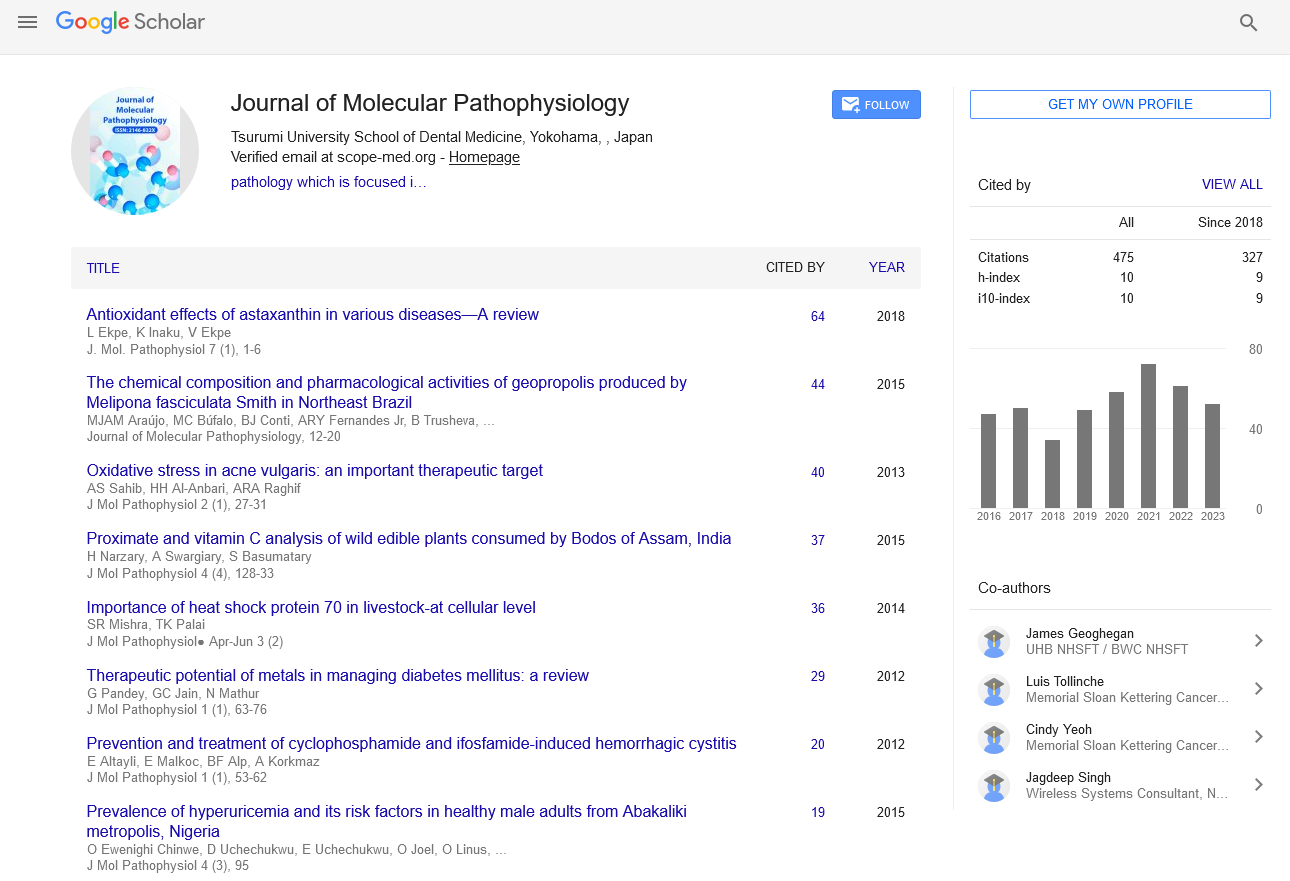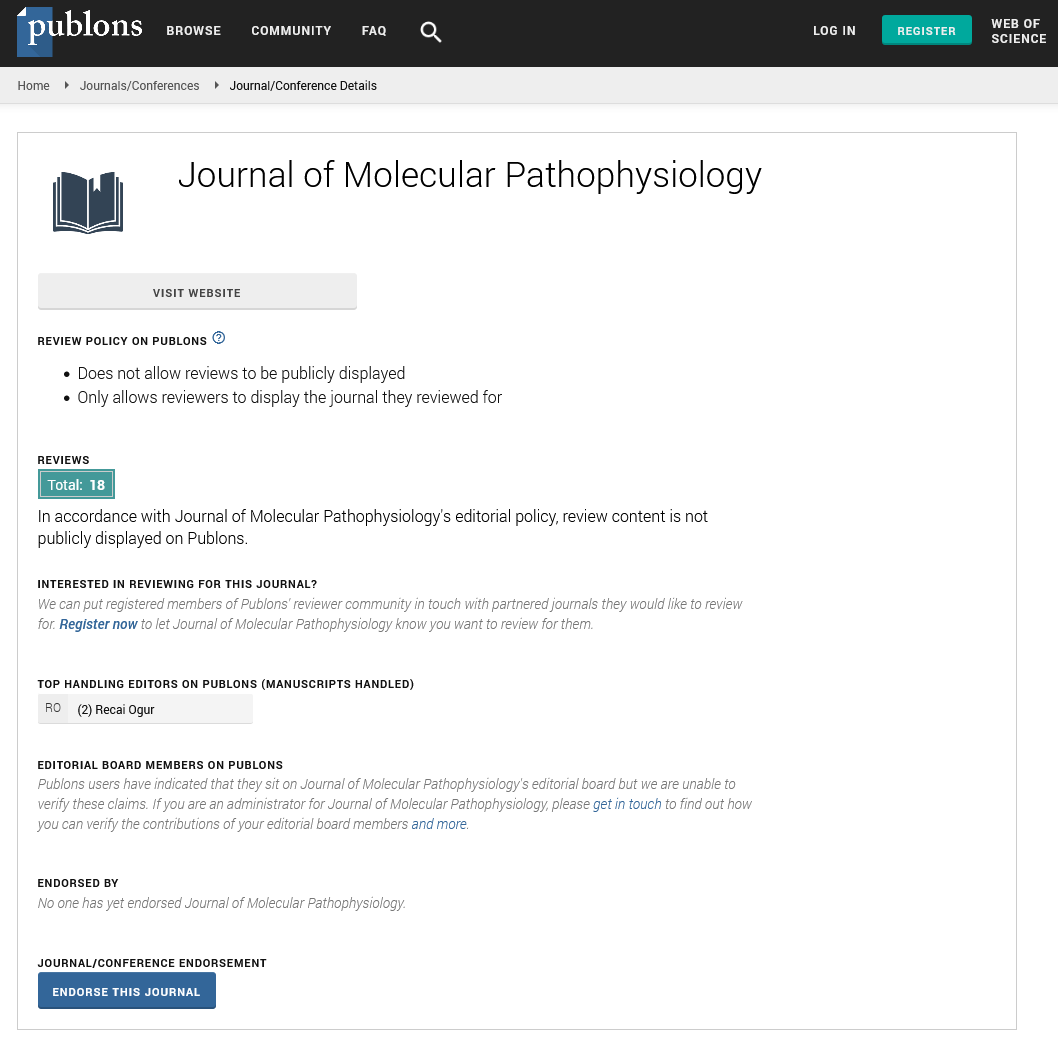Perspective - Journal of Molecular Pathophysiology (2023)
Consequences and the Intricate Pathophysiology of Irritable Bowel Syndrome
Ines Strnad*Ines Strnad, Department of Gastroenterology, Odense University, Odense, Denmark, Email: Strnad2000@yahoo.co
Received: 18-Jul-2023, Manuscript No. JMOLPAT-23-111325; Editor assigned: 21-Jul-2023, Pre QC No. JMOLPAT-23-111325 (PQ); Reviewed: 07-Aug-2023, QC No. JMOLPAT-23-111325; Revised: 14-Aug-2023, Manuscript No. JMOLPAT-23-111325 (R); Published: 21-Aug-2023
About the Study
Irritable Bowel Syndrome (IBS) is a complex and multifactorial functional gastrointestinal disorder that is characterized by chronic abdominal pain, altered bowel habits, and bloating. While the exact cause of IBS remains elusive, research has increasingly focused on the role of psychological factors, particularly negative effects, in both the pathophysiology and clinical expression of this condition. Negative effects, encompassing emotions such as anxiety, depression, and stress, have been implicated in exacerbating symptoms and influencing the disease trajectory of IBS. The gut-brain axis, a bidirectional communication network between the central nervous system and the gastrointestinal tract, plays a significant role in the development and maintenance of IBS. Negative effects are known to disrupt this delicate balance, triggering an array of physiological and biochemical changes that can exacerbate the symptoms of IBS. Psychological distress is associated with alterations in gut motility, visceral hypersensitivity, and immune function, all of which are central to the pathophysiology of IBS. Stress, for instance, activates the Hypothalamic Pituitary Adrenal (HPA) axis, leading to the release of stress hormones such as cortisol. These hormones can influence gut motility and increase inflammation, potentially contributing to the exacerbation of IBS symptoms.
The relationship between negative effects and IBS is bidirectional, with each influencing the other in a complex feedback loop. The chronic and distressing nature of IBS symptoms can lead to increased levels of anxiety and depression. The unpredictable and often embarrassing nature of bowel symptoms can exacerbate social and psychological distress, forming a self-perpetuating cycle. On the other hand, pre-existing psychological distress can predispose individuals to develop IBS. Early life stress, trauma, and a history of mood disorders have been linked to an increased risk of developing IBS later in life. This underscores the importance of addressing negative affects not only as a consequence but also as a potential precursor of IBS. One of the hallmarks of IBS is visceral hypersensitivity, wherein individuals experience heightened pain perception in response to normal gut stimuli. Negative affects play a crucial role in modulating pain perception. Anxiety and depression can amplify the brain's perception of pain signals, leading to a lower pain threshold and increased pain intensity. This phenomenon, known as central sensitization, is thought to contribute to the severity of abdominal pain experienced by individuals with IBS. Moreover, the emotional distress associated with negative effects can lead to increased vigilance towards bodily sensations, making individuals more attuned to gastrointestinal symptoms, further magnifying their impact.
Implications for clinical management
Recognizing the intricate interplay between negative effects and IBS is essential for designing effective therapeutic interventions. Traditional approaches to managing IBS have primarily focused on dietary modifications, pharmacological treatments, and lifestyle changes. However, these approaches often provide only partial relief, leaving a significant proportion of patients with uncontrolled symptoms. IBS patients symptom control and general quality of life may be improved by including psychosocial therapies that target negative emotions. Cognitive Behavioral Therapy (CBT) is a widely studied psychological intervention, has gained attention as a valuable tool in managing IBS. By addressing maladaptive thought patterns and behaviors, CBT helps individuals reframe their perceptions of symptoms and develop coping strategies. This can lead to a reduction in anxiety and depression, subsequently alleviating the impact of negative effects on IBS symptoms. Mindfulness-based interventions and relaxation techniques offer individuals with IBS practical tools to manage stress and anxiety. These practices promote emotional regulation and enhance self-awareness, helping individuals break the cycle of negative affects exacerbating gut symptoms.
Recognizing the role of negative effects in IBS has also prompted investigations into pharmacological approaches that target both gastrointestinal and psychological aspects. Certain antidepressant medications, such as Selective Serotonin Reuptake Inhibitors (SSRIs) and Tricyclic Antidepressants (TCAs), have shown efficacy in alleviating pain and improving mood, suggesting their potential role in addressing the multidimensional nature of IBS. The intricate relationship between negative effects and IBS underscores the need for a comprehensive and holistic approach to managing this complex disorder. Healthcare practitioners can design interventions that not only address digestive symptoms but also target the emotional discomfort that frequently goes along with IBS since they are aware of the bidirectional influence of negative effects on the condition.







